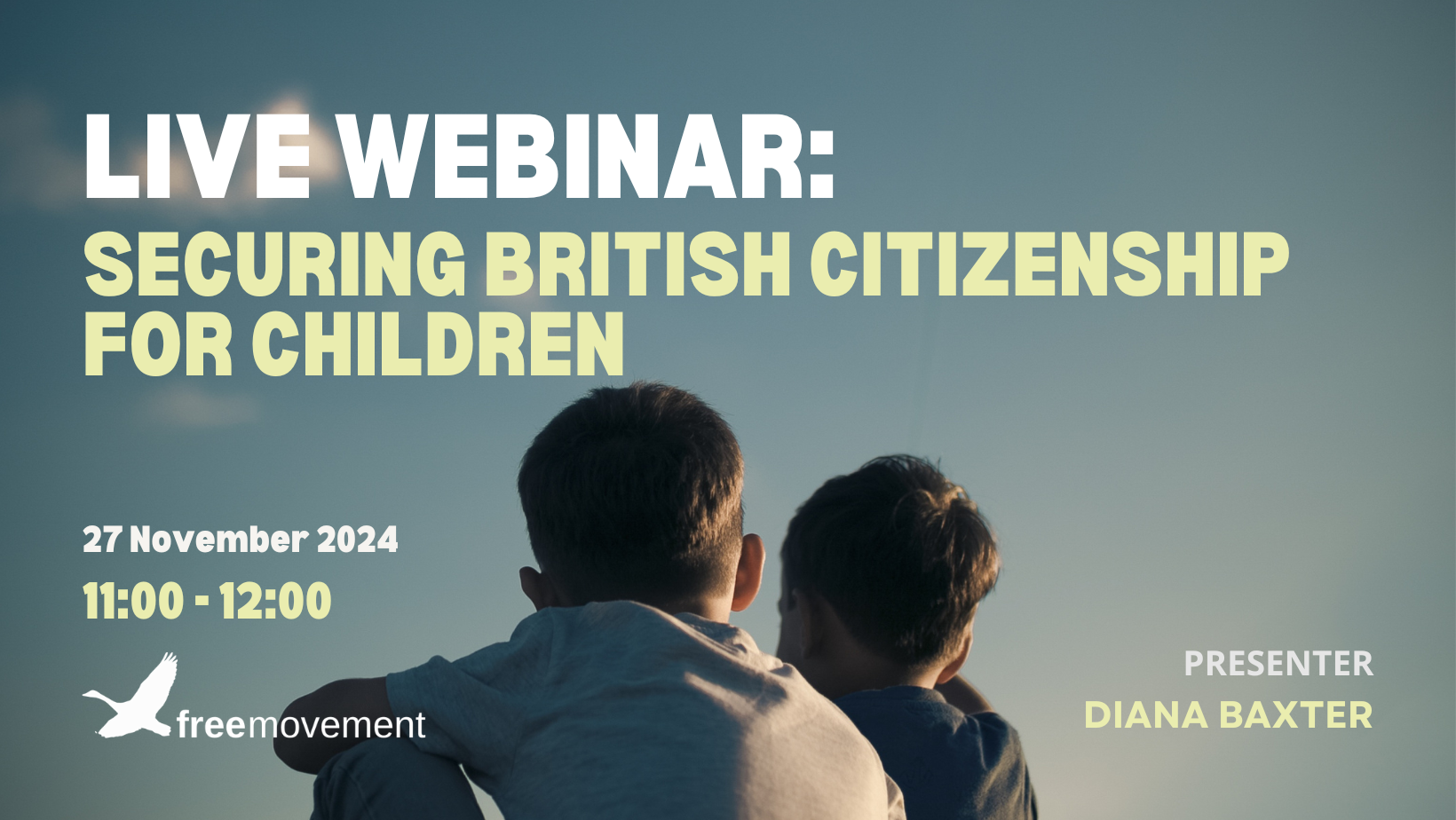Spain has been ordered by the European Court docket of Human Rights to pay a Nigerian girl €15,000 in damages as compensation for failures regarding the investigation of allegations that she was trafficked to Spain for compelled prostitution. The case is T.V. v. Spain (application no. 22512/21) and though the UK was not on the receiving finish of the choice, there are parts which are of relevance right here too.
Intervening within the case have been the Council of Europe’s Group of Consultants on Motion in opposition to Trafficking in Human Beings (GRETA) and the AIRE Centre (Recommendation on Particular person Rights in Europe). Though a case in opposition to Spain, TV was represented by UK based mostly attorneys Duncan Lewis (see additionally the press release from One Pump Court).
Background
The applicant is a Nigerian nationwide who was trafficked to Spain for the needs of sexual exploitation in 2003 when she was 14 years previous. The trafficker’s mother and father in Nigeria carried out a “voodoo” (or “juju”) ritual on her such that she believed that if she reported the trafficker to the police then the voodoo would kill her.
In 2007 the applicant escaped her trafficker (“C”), though she continued to contact the applicant relating to the “debt” owed to C for being dropped at Spain, till the applicant misplaced her telephone in 2010. Since her escape, the trafficker’s household “had destroyed her father’s business in Nigeria and assaulted him in an attempt to make the applicant pay the debt”.
On 9 June 2011 the applicant went to the police and made a grievance that she had been a sufferer of human trafficking and sexual exploitation from 2003 to 2007. She defined that she had not reported this earlier due to the voodoo ritual, nevertheless had been capable of overcome her worry of this when supplied with social and medical help.
On 24 June 2011 an investigating courtroom opened a preliminary investigation however then instantly discontinued it for lack of territorial jurisdiction. A month later the case was referred to the investigating courtroom that did have jurisdiction and a preliminary investigation was opened in November 2011. The native legislation enforcement company was instructed to find the traffickers and to take proof from the applicant.
As is the case within the UK, an ongoing legal investigation into an individual’s traffickers could be related to their means to acquire a type of immigration standing. In 2012 an NGO that was supporting the applicant made a grievance concerning the lack of progress on her case as that was negatively impacting her immigration standing.
In January 2013 the investigating courtroom reiterated the request made to the native legislation enforcement company, in addition to issuing summonses for the alleged traffickers to be questioned as suspects. In February 2013 the legislation enforcement company suggested that that they had been unable to find the traffickers C and her husband U however had recognized two individuals who had run the “hostess club” the applicant had been exploited in. The courtroom issued a summons for these folks to be questioned on suspicion of trafficking in human beings.
In March 2013 the applicant gave proof about what had occurred to her, that she was receiving psychological therapy due to the occasions complained of, and that her household in Nigeria had needed to transfer due to worry of additional threats and assaults.
On 26 April 2013 the investigating courtroom dismissed the case in opposition to all 4 folks suspected of trafficking the applicant, on the premise that it had not been “sufficiently established” that the offence had been dedicated. A public prosecutor appealed the choice in Might 2013 and the investigating courtroom allowed this on 21 April 2014, ordering that C and U have been positioned and questioned and that the date the applicant entered Spain be recognized.
U was positioned and interviewed in Might 2014 and in August 2014 C was positioned and interviewed. Each C and U denied the allegations. U’s defence requested for a forensic age evaluation of the applicant, arguing that it was important to find out her age in order that the allegations may very well be correctly legally labeled (i.e. as a result of there was a distinction if she was a minor on the time).
On 8 June 2015 the investigating courtroom issued an indictment in opposition to C and U. A forensic knowledgeable carried out an age evaluation of the applicant and decided that she was over 18. In March 2016 the courtroom ordered a supplementary report to find out an age vary somewhat than simply saying that the applicant was over 18. The knowledgeable decided that the situation of her molars was “statistically consistent with an age interval of 22.4 years, with a margin of +/- 1.9 years”.
The case was then dismissed on account of the age evaluation. The applicant appealed on the premise that age assessments are ineffective and unreliable and that the authorities had did not bear in mind the whole lot of her proof which had been detailed and constant. The choice to dismiss the case was upheld, the courtroom saying that it was not doable for her to have entered Spain on an grownup passport when she was six years previous (seemingly in reliance on the primary forensic report which stated she was over 18).
Unsurprisingly, the applicant appealed once more, stating that the courtroom’s evaluation of the age evaluation report was “manifestly erroneous and lacked logical reasoning”. It was once more identified that age assessments should not dependable. Different grounds have been additionally raised, however the enchantment was dismissed on the grounds of “non-existence of a violation of a fundamental right”.
The European Court docket of Human Rights
The applicant then proceeded to the European Court docket of Human Rights, making a grievance below article 4 of the European Conference on Human Rights that there had been a failure to “investigate, prosecute and punish those who had subjected her to human trafficking”. The applicant complained of the delay within the investigation and the gathering of proof.
It was additionally argued that her:
case had been dismissed predominantly on the premise of such a slender and arbitrary interpretation of the age evaluation knowledgeable report, whereas the authorities had manifestly did not take cheap steps to gather proof and elucidate the circumstances of the case, together with by pursuing apparent traces of inquiry, even supposing she had drawn their consideration to such apparent shortcomings within the home proceedings.
The federal government stated that the size of the investigation was cheap given the occasions complained of had occurred years earlier and so they solely had “scarce and fragmentary information”. It was additionally submitted that the choice to dismiss the case had not been based mostly solely on the x-ray examination however on the forensic knowledgeable’s report and the dearth of minimal proof to corroborate the applicant’s allegations. The federal government’s place was that the final level was sufficient by itself to justify dismissal of the case, criticising inconsistencies within the applicant’s proof, together with round her age.
Each the applicant and the AIRE Centre referred to varied choices regarding Spain made by the Committee below the Non-compulsory Protocol to the Conference on the Rights of the Little one the place the inaccuracy of x-ray age assessments and different defects within the age evaluation course of had been highlighted.
GRETA had additionally raised issues about Spain’s use of age evaluation procedures in experiences in 2018 and 2023 and had really useful a overview of the method. GRETA additionally stated that “Owing to the physical and psychological trauma suffered, victims of trafficking could change their statements over time. The age assessment procedure was not to be used to cast doubt on a person’s claim that he or she was a victim of human trafficking.”
The courtroom stated that the applicant’s allegations “despite some divergent elements, remained consistent throughout the domestic proceedings” and that the alleged use of “voodoo” corresponds to a identified methodology of trafficking folks from Nigeria. The courtroom was happy that “the applicant has made an arguable claim, supported by prima facie evidence, that she was subjected to human trafficking and forced prostitution”. The courtroom then went on to think about the investigation in gentle of the rules in S.M. v. Croatia [GC], no. 60561/14 setting out the states’ procedural obligations in instances regarding human trafficking and compelled prostitution (from para 308).
The courtroom accepted that the formal inquiry was opened instantly and the applicant issued with a residence allow based mostly on her cooperation with the authorities as there have been cheap grounds to imagine that she was a sufferer of trafficking and sexual exploitation. Nevertheless the courtroom was important of the 5 month delay in referring the case to the right territorial jurisdiction and concluded that between November 2011 and January 2013 “the authorities remained completely passive and took no effective investigative steps”.
That delay had a unfavourable impact on the applicant’s immigration standing, leaving her with out standing from October 2011 till the police filed a brand new request for her regularisation in summer season 2012. The courtroom additionally criticised the 11 month interval between Might 2013 and the investigating courtroom’s choice of April 2014 to order additional fundamental investigative steps. The courtroom held that “it clearly cannot be said that the authorities acted with the requisite diligence at the initial stage of the investigation”.
The courtroom additionally held that the Spanish authorities had “failed to follow obvious lines of inquiry in order to gather the available evidence, in accordance with their procedural obligation under Article 4”.
On the age evaluation level, the courtroom identified that “both reports contained the same conclusion namely that the applicant was at least 18 years old at the time of the relevant forensic examinations … thus making it clear that they determined solely the applicant’s minimum age and not her exact age”. No causes have been offered in both of the courts’ choices as to how that they had then concluded that this meant she was precisely 18 on the date of the age evaluation.
Additional, the courts had different proof making it clear that she was participating with varied authorities and organisations as an grownup for years earlier than the age evaluation passed off, for instance she had been arrested for immigration offences in 2005 and 2009. The courtroom concluded that the Spanish courts’ choices to dismiss the case “were not based on thorough and objective analysis of all relevant elements, but rather on unexplained assumptions, and were not sufficiently reasoned”.
A violation of article 4 was discovered and the applicant was awarded €15,000 in damages and €12,000 for her authorized prices. The applicant had additionally sought compensation for a deprivation of her proper to assert damages following on from the dismissal of the legal case, nevertheless this was deemed to be unsubstantiated and was rejected on the grounds of being manifestly ill-founded.
Conclusion
Though this was a case in opposition to Spain, there are a few helpful factors for us right here within the UK. Though the courtroom on this case declined to deal with the overall issues raised about the usage of “scientific” age assessments, it’s price remembering that the UK additionally handed legal guidelines earlier this year allowing the usage of these. The report published yesterday by Refugee Council made a number of suggestions regarding age assessments, together with “abandoning the implementation of the provisions that pave the way for the use of unreliable scientific (biological) methods to determine age”.
You will need to keep in mind the duties owed by the authorities to those that have survived trafficking, together with in relation to the necessity for a correct investigation. The Nationality and Borders Act 2022 severely restricted the circumstances wherein survivors could be granted depart and cooperating with a police investigation is among the remaining causes an individual could be granted depart. If the police are reluctant or gradual to do that, this case ought to act as a reminder that it could be doable to problem that, which can then help somebody in acquiring a grant of depart.
It’s also essential to pay attention to the compensation scheme accessible to survivors from the “Criminal Injuries Compensation Authority” (more details from After Exploitation here).


All in favour of refugee legislation? You would possibly like Colin’s e book, imaginatively referred to as “Refugee Law” and printed by Bristol College Press.
Speaking essential authorized ideas in an approachable approach, that is a necessary guide for college students, attorneys and non-specialists alike.





